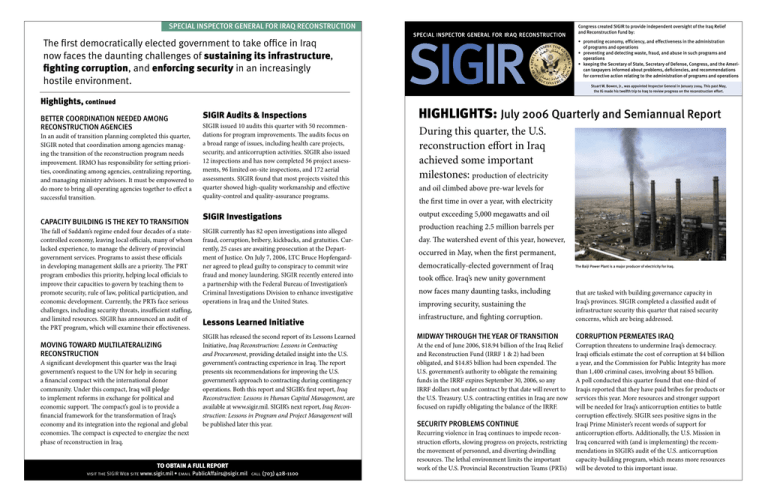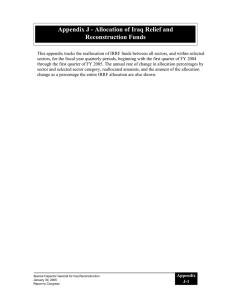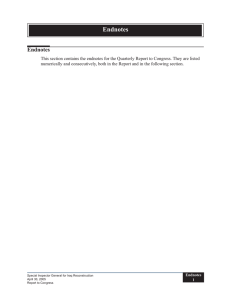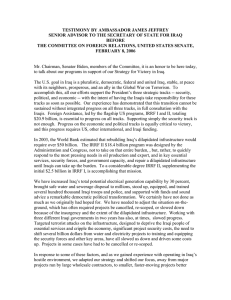Document 11046911
advertisement

SPECIAL INSPECTOR GENERAL FOR IRAQ RECONSTRUCTION The first democratically elected government to take office in Iraq now faces the daunting challenges of sustaining its infrastructure, fighting corruption, and enforcing security in an increasingly hostile environment. Highlights, continued Better Coordination Needed Among Reconstruction Agencies In an audit of transition planning completed this quarter, SIGIR noted that coordination among agencies managing the transition of the reconstruction program needs improvement. IRMO has responsibility for setting priorities, coordinating among agencies, centralizing reporting, and managing ministry advisors. It must be empowered to do more to bring all operating agencies together to effect a successful transition. Capacity Building is the key to Transition The fall of Saddam’s regime ended four decades of a statecontrolled economy, leaving local officials, many of whom lacked experience, to manage the delivery of provincial government services. Programs to assist these officials in developing management skills are a priority. The PRT program embodies this priority, helping local officials to improve their capacities to govern by teaching them to promote security, rule of law, political participation, and economic development. Currently, the PRTs face serious challenges, including security threats, insufficient staffing, and limited resources. SIGIR has announced an audit of the PRT program, which will examine their effectiveness. moving toward Multilateralizing Reconstruction A significant development this quarter was the Iraqi government’s request to the UN for help in securing a financial compact with the international donor community. Under this compact, Iraq will pledge to implement reforms in exchange for political and economic support. The compact’s goal is to provide a financial framework for the transformation of Iraq’s economy and its integration into the regional and global economies. The compact is expected to energize the next phase of reconstruction in Iraq. SIGIR Audits & Inspections Congress created SIGIR to provide independent oversight of the Iraq Relief and Reconstruction Fund by: SPECIAL INSPECTOR GENERAL FOR IRAQ RECONSTRUCTION • promoting economy, efficiency, and effectiveness in the administration of programs and operations • preventing and detecting waste, fraud, and abuse in such programs and operations • keeping the Secretary of State, Secretary of Defense, Congress, and the American taxpayers informed about problems, deficiencies, and recommendations for corrective action relating to the administration of programs and operations Stuart W. Bowen, Jr., was appointed Inspector General in January 2004. This past May, the IG made his twelfth trip to Iraq to review progress on the reconstruction effort. HIGHLIGHTS: July 2006 Quarterly and Semiannual Report SIGIR issued 10 audits this quarter with 50 recommendations for program improvements. The audits focus on a broad range of issues, including health care projects, security, and anticorruption activities. SIGIR also issued 12 inspections and has now completed 56 project assessments, 96 limited on-site inspections, and 172 aerial assessments. SIGIR found that most projects visited this quarter showed high-quality workmanship and effective quality-control and quality-assurance programs. During this quarter, the U.S. reconstruction effort in Iraq achieved some important milestones: production of electricity SIGIR Investigations output exceeding 5,000 megawatts and oil SIGIR currently has 82 open investigations into alleged fraud, corruption, bribery, kickbacks, and gratuities. Currently, 25 cases are awaiting prosecution at the Department of Justice. On July 7, 2006, LTC Bruce Hopfengardner agreed to plead guilty to conspiracy to commit wire fraud and money laundering. SIGIR recently entered into a partnership with the Federal Bureau of Investigation’s Criminal Investigations Division to enhance investigative operations in Iraq and the United States. Lessons Learned Initiative SIGIR has released the second report of its Lessons Learned Initiative, Iraq Reconstruction: Lessons in Contracting and Procurement, providing detailed insight into the U.S. government’s contracting experience in Iraq. The report presents six recommendations for improving the U.S. government’s approach to contracting during contingency operations. Both this report and SIGIR’s first report, Iraq Reconstruction: Lessons in Human Capital Management, are available at www.sigir.mil. SIGIR’s next report, Iraq Reconstruction: Lessons in Program and Project Management will be published later this year. TO OBTAIN A FULL REPORT visit the SIGIR Web site www.sigir.mil • email PublicAffairs@sigir.mil call (703) 428-1100 and oil climbed above pre-war levels for the first time in over a year, with electricity production reaching 2.5 million barrels per day. The watershed event of this year, however, occurred in May, when the first permanent, democratically-elected government of Iraq The Baiji Power Plant is a major producer of electricity for Iraq. took office. Iraq’s new unity government now faces many daunting tasks, including infrastructure, and fighting corruption. that are tasked with building governance capacity in Iraq’s provinces. SIGIR completed a classified audit of infrastructure security this quarter that raised security concerns, which are being addressed. Midway Through the Year of Transition Corruption Permeates Iraq At the end of June 2006, $18.94 billion of the Iraq Relief and Reconstruction Fund (IRRF 1 & 2) had been obligated, and $14.85 billion had been expended. The U.S. government’s authority to obligate the remaining funds in the IRRF expires September 30, 2006, so any IRRF dollars not under contract by that date will revert to the U.S. Treasury. U.S. contracting entities in Iraq are now focused on rapidly obligating the balance of the IRRF. Corruption threatens to undermine Iraq’s democracy. Iraqi officials estimate the cost of corruption at $4 billion a year, and the Commission for Public Integrity has more than 1,400 criminal cases, involving about $5 billion. A poll conducted this quarter found that one-third of Iraqis reported that they have paid bribes for products or services this year. More resources and stronger support will be needed for Iraq’s anticorruption entities to battle corruption effectively. SIGIR sees positive signs in the Iraqi Prime Minister’s recent words of support for anticorruption efforts. Additionally, the U.S. Mission in Iraq concurred with (and is implementing) the recommendations in SIGIR’s audit of the U.S. anticorruption capacity-building program, which means more resources will be devoted to this important issue. improving security, sustaining the Security problems Continue Recurring violence in Iraq continues to impede reconstruction efforts, slowing progress on projects, restricting the movement of personnel, and diverting dwindling resources. The lethal environment limits the important work of the U.S. Provincial Reconstruction Teams (PRTs) Jan 4/16 2003 Jul Coalition Land Forces Enter Iraq Apr Oct $ Billions • Agriculture: USAID is implementing a $107 million program for new agricultural initiatives. • Democracy: The U.S. continues to promote democracy-building initiatives and to field PRTs to help build provincial governance capacity. • Education: 1,544 schools have been repaired or rehabilitated with IRRF 2 funds. The United States has also trained more than 60,000 teachers. • Private Sector Development: USAID-funded projects account for nearly half of the $800 million obligated to date, with activities focusing on economic governance and trade, bank lending, capital markets, and microfinance activities. PROJECTS $1.51 APRIL 06 •As a result of U.S. projects, 16 loading docks are now functioning at the port of Umm Qasr; only one dock was functioning at the end of the war. •U.S. projects have restored commercial operations to the three major airports in Iraq: Baghdad, Basrah, and Mosul. Kirkuk and Erbil airfields are also operating. •U.S. projects have nearly completed repairs at 82 of Iraq’s railway stations. However, only a small number of trains are operating because of security problems. $ Billions COMPLETED 8798 EXPENDED $1.74 ONGOING JUNE 06 896 NOT STARTED 109 Sub-sector Status $0.42 APRIL 06 EXPENDED $0.48 JUNE 06 ALLOCATED $2.23 OBLIGATED $2.12 Sector Status PROJECTS COMPLETED 278 ONGOING 179 NOT STARTED 54 ALLOCATED $0.80 OBLIGATED $0.74 AGRICULTURE, DEMOCRACY, EDUCATION, AND PRIVATE SECTOR DEVELOPMENT $ Billions TRANSPORTATION & COMMUNICATIONS $0.82 APRIL 06 EXPENDED $1.00 JUNE 06 ALLOCATED $1.72 OBLIGATED $1.65 Oct •Oil production spiked to a production level of 2.5 MBPD in mid-June, but decreased to 2.35 and 2.23, respectively, for the last two weeks of the month. •Exports averaged 1.6 MBPD for the quarter and closed at 1.67 MBPD, slightly above the Iraqi goal of 1.65 MBPD. •Security problems and corruption have limited progress on production and development in this sector. A comprehensive petroleum law is needed to stimulate essential foreign investment. PROJECTS COMPLETED 22 ONGOING 33 NOT STARTED 2 2004 Jul •U.S. projects have contributed 2,710 MW to Iraq’s generation capacity, which climbed above pre-war levels (4,500 MW) to 5,042 MW, as of June 27, 2006. Load served topped 100,000 MWh for the first time since summer 2005. •All generation projects have been started. More than 1/3 of distribution and transmission projects have yet to start. •Areas outside of Baghdad now receive more hours of power (12.1) than before the conflict. However, electricity hours in Baghdad still remain below pre-war levels (8.1). $ Billions OIL & GAS Apr Sector Status $2.03 APRIL 06 EXPENDED $2.35 JUNE 06 OBLIGATED $3.48 ALLOCATED $4.22 6/1 IRMO & PCO Established by NSPD-36 Apr Jul 2005 Spring 2005 5/11 IRMO, PCO, & JCC-I JCC-I Established 1/29 PROJECTS WATER Apr 2005 Jul COMPLETED 749 ONGOING 515 NOT STARTED 95 $0.89 APRIL 06 Jan $ Billions EXPENDED $1.14 JUNE 06 OBLIGATED $1.68 ALLOCATED $2.13 Oct 12/15 $0.42 APRIL 06 $ Billions EXPENDED $0.49 JUNE 06 ALLOCATED $0.75 OBLIGATED $0.66 •More than 80% of health care projects have been completed, but progress has been significantly slowed by security problems and mismanagement. •The construction of primary health care centers has fallen far short of original goals. •USAID’s non-construction activities in this sector are projected to be completed during the next quarter. Vaccination programs have been highly successful. Sector Status PROJECTS COMPLETED 653 ONGOING 138 NOT STARTED 4 HEALTH CARE 4/22 5/3 5/20 JULY 2006 QUARTERLY AND SEMIANNUAL REPORT COMPLETED 1,278 ONGOING 156 NOT STARTED 65 Jul $ Billions EXPENDED $5.41 JUNE 06 12 9 44 Electricity 23 35 Security & Justice Reconstruction Management (1%) % of $18.44 Billion Source: DoS Iraq Weekly Status Report, 06/28/06 Sector Shares of IRRF Funds Figure x-x Source: DoS Iraq Weekly Status 06/28/06 IRRF Sector SharesReport, Pie.ai Agriculture, Democracy, Education, & Private Sector Development Water 12 Oil & Gas Transportation & Communications Health Care % of $18.44 Billion SECTOR SHARES OF IRRF FUNDS •More than 268,000 military and police personnel have been trained, equipped, and fielded. Activities are increasingly focused on improving Iraqi logistical capabilities and leadership. •More than 1,200 security facilities have been completed to date, including police and fire stations. •85% of IRRF funding for this sector has been expended; the Emergency Supplemental Appropriations for FY 2006 provided an additional $3 billion to the Iraq Security Forces Fund (ISFF). Sector Status PROJECTS $5.20 APRIL 06 ALLOCATED $6.38 OBLIGATED $6.15 Iraq's Parliament Meets for First Time Unity Government Formed SECURITY & JUSTICE 2006 Apr 69% of IRRF 2 Expended 6/30 $3 billion for ISFF in P.L. 109-234 6/15 Jul Jawad al-Maliki Selected as Iraq's First Constitutional Prime Minister Constitutionally Based Elections for Assembly Constitutional Referendum 10/15 PCO Merged under GRD 12/5 •1.1 million more people gained access to clean water as a result of U.S. projects this quarter. •5.1 million more people have access to sanitation services as a result of U.S. projects. •A GAO audit noted the challenge of sustaining U.S. projects in the water sector. In response, the U.S. initiated a new $110 million sustainment program for this sector. Sector Status Jan 4/28 Apr 2006 50% of IRRF 2 Expended 11/1 Jan www.sigir.mil email: PublicAffairs@sigir.mil (703) 428-1100 Oct Khalilzad Appointed U.S. Ambassador to Iraq 6/21 Iraqi Transitional Government Formed First Democratic Elections in Iraq 1/30 MNSTC-I (Multi-National Security Transition Command–Iraq) Established Iraqi Interim Government Announced Transitional Administrative Law (TAL) Signed 3/8 Oct. 2004 Transfer of SIGIR Sovereignty; Created CPA Dissolves (PCO replaces PMO) 6/28 Winter 2004 Jan $5.7 billion for the ISFF in P.L. 109-13 Third Major Reprogramming of IRRF 2 Second Major Reprogramming of IRRF 2 First Major Reprogramming of IRRF 2 Fall 2004 Oct Sector Status PROJECTS COMPLETED 287 ONGOING 131 NOT STARTED 178 ELECTRICITY 5/11 First DoS Section 2207 Report 1/5 March 2004 Jul 2004 Large-scale Design-Build Contracts Awarded Apr USACE Gulf Region Division Activated 1/25 CPA-IG Appointed 1/20 Jan Madrid Donors Conference Program Management Office (PMO) Created 8/15 Jan IRRF 2 Established under P.L. 108-106 $18.44B 11/6 C PA De-Ba’athification Order Issued and Iraq Army Disbanded 5/16 Liberation Day 4/9 ORHA Mobilizes to Kuwait 3/21 6/15 CPA Program Review Board Created CPA Created by CENTCOM 4/16 ORHA Established under NSPD-24 3/16 10/23-24 Oct IRAQ RECONSTRUCTION SECTOR ACTIVITY Jan Other 1/20 DFI Created under UN Res. 1483 5/22 Jul 2003 IRRF 1 Established under P.L. 108-11 $2.48B ORHA Apr Organizational Funding PRE-WAR PLANNING 2002 2002 Oct Oct IRAQ RECONSTRUCTION TIMELINE SI GI R SPECIAL INSPEC TO R GENER AL FOR IR AQ RECONSTRUC TION




